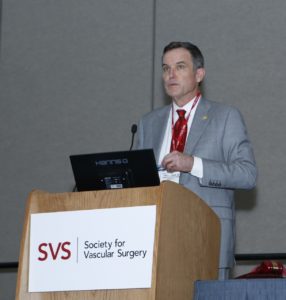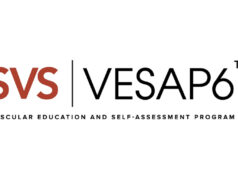
This year’s E. Stanley Crawford Critical Issues Forum is set to come full circle from its very genesis 32 years ago at the Vascular Annual Meeting (VAM) in Chicago.
Now a lynchpin of the Society for Vascular Surgery (SVS) flagship event on its opening day, this year not only will it make an unlikely return to the original Saturday slot it occupied in 1988 but also to the spirit of the fundamental themes outlined by E. Stanley Crawford, MD, then the outgoing SVS president, when he called for the forum’s introduction.
As per tradition, the session is the brainchild of the incoming SVS president. This year’s rendering of the forum, entitled “Defining and valuing vascular surgery in the coming decade,” covers vascular surgery branding, the value of the specialty to the healthcare system, a SVS Wellness Task Force pulse check, and insight on how U.S. healthcare rankings are compiled by U.S. News & World Report. It kicks off on Saturday, June 20, at 12:45 p.m.
President-elect Ronald L. Dalman, MD, saw the founding charge set out by his forbear reverberating down the years.
“The original impetus for the meeting was to affirm the leadership of the SVS in the development of vascular surgical science and help the society to navigate the challenges of the times, separate from the more scientific presentations: The question that was posed by E. Stanley Crawford was, ‘Who would want to go into vascular surgery today with the uncertainties of tomorrow and how can those who are already committed remain dominant?’” the president-elect tells Vascular Connections. “That’s the founding charge.”
VAM 2020, of course, has been replaced by the alternative virtual conference, SVS ONLINE, owing to the novel coronavirus.
As Dalman notes, VAM traditionally was held at the beginning of the week, in contrast to more recent times when the conference has begun on a Wednesday: “So it being on a Saturday this year, we have come full circle on that.”
That extends to the theme. Dalman considers the varying topics that have constituted the forum over the years. Some have been clinical, he says, while more recently and commonly they have tended toward some of the more macro level challenges to vascular surgery practice.
It’s at this juncture Dalman slots in, picking up the baton left first by Michel S. Makaroun, MD, SVS president from 2018–19, and Kim Hodgson, MD, the current president. While the former focused on the perils of a coming shortage in vascular surgeons, Hodgson zeroed in on appropriateness in care.
Which brings things neatly back to the baseline set by Crawford three decades ago. In June 1996, Calvin B. Ernst, MD, penned an article in the Journal of Vascular Surgery that recalled the opening years of the Crawford forum’s journey.
GENESIS
“It’s ironic if you read this article, many of those same issues and questions were being addressed more than 30 years ago,” says Dalman. “They’ve evolved, they’ve expanded, they’ve taken on different levels of urgency. But the fundamental questions are still there. I think that’s how we came up with the program for this year’s Crawford Critical Issues Forum.”
The first presentation on the Crawford slate sees Joseph Mills, MD, professor and chief in the division of vascular surgery and endovascular therapy at Baylor College of Medicine in Houston, provide an update on the SVS Branding Initiative Task Force. Mills will cover the work the Society has carried out with Springboard Brand & Creative Strategy to thrash out how vascular surgeons fit in to the American health system, what the role of the vascular specialist should be and how they can differentiate themselves from other specialties with occasionally overlapping interests, explains Dalman. “The Branding Initiative Task Force is going to help us understand and position vascular surgery in such a way that our colleagues in the health system, and leaders in American healthcare who might not be physicians themselves, can understand what it is we do exactly.”
Next to take to the podium will be Richard Powell, MD, of Dartmouth-Hitchcock Medical Center in Lebanon, New Hampshire. Delivering a talk entitled, “Value of the vascular surgeon to the healthcare system,” he will drill into the Vascular Valuation Study, a collaboration with healthcare intelligence services company Sg2 to complete a comprehensive assessment and consulting report on the valuation of vascular surgery services—a process that began under the presidency of Makaroun.
As Dalman describes, the purpose of this talk is to pose some fundamental questions: “What is the value of a vascular surgeon to our healthcare system, to our community, to our region to the nation, aside from the patients that we have primary responsibility for, what value add do we provide to the care of the population as whole?”
SURGEON WELLNESS
The specter of vascular surgeon burnout has moved up the agenda in recent years, treated with increasing levels of seriousness. It was into this new atmosphere the SVS Wellness Task Force—about to become a full-fledged council—emerged.
It occupies an important place in the vascular firmament.
“One of my colleagues, Larry Kraiss, MD, at the University of Utah, told me that they had looked at their clinical volume and determined that about 40% of their patients did not come from their clinic, which means they came through the emergency room or transfer request, consultation in the operating room for bleeding or some other technical challenge another specialty may be facing. In that regard, we operate with urology, surgical oncology, neurosurgery, cardiac surgery, OBGYN, general surgery—anytime there’s a significant bleeding problem in the operating room at almost every hospital in the country, there’s some sort of urgent or emergent page for a vascular surgeon to stop what they’re doing and come help. That’s fine, that’s our role. But the question is: What toll does that take on vascular surgeons?”
The third podium talk in the forum—“Maintaining vascular capability in troubled times: Update from the SVS Wellness Task Force”—deals with this question.
Delivered by Dawn Coleman, MD, associate professor, surgery, at the University of Michigan in Ann Arbor, Michigan, Malachi Sheahan III, MD, chair of vascular surgery at Louisiana State University Health Sciences Center in New Orleans, they will delve into the sustainability of the demands on vascular specialists through mediums such as their work with SurgeonMasters, and in webinars and town halls.
“To get back to Dr. Crawford’s original message—who would want to go into vascular surgery? Well, certainly if everybody is depressed and overworked nobody would want to go into vascular surgery.”
The final presentation underscores Dalman’s vision for this year’s Crawford forum. It will be given by Benjamin Harder, managing editor and chief of health analysis at U.S. News & World Report.
Harder is involved in putting together the influential healthcare rankings published by the publication.
“One of the challenges for our members in the U.S. at the current time is the U.S. News & World Report rankings do not recognize vascular surgery as a separate specialty,” says Dalman. “They have cardiology, cardiac surgery, neurological surgery, general surgery.”
This raises one of the existential questions in vascular surgery at present.
“I would say, being as objective as I can, vascular surgery is one of the largest and most influential specialties that is not recognized as a separate specialty,” Dalman continues. “The problem for our membership, then, is when they go to their health system leadership. They say, ‘We need more support from advanced practice providers like nurse practitioners or physicians assistants. Or we need new operating room equipment, or we need new clinic space, more block time in the operating room.’ They’ll say, ‘You’re a vascular surgeon but that’s not in the US News & World Report rankings, so, quite frankly, we don’t have the resources available to help you.’
“It’s the impression of many of our members, myself included, that they give a different answer to the services that are ranked. Because they are counted in the rankings.”
RANKING VASCULAR SURGERY
There is a narrative flow to this year’s forum. The running order was no mere accident. Dalman was very deliberate in its constitution. His guiding rationale was to construct the thread of presentations in such a way as the last speaker, Harder, would absorb the preceding talks before himself taking to the podium. His assigned talk captures the essence of Dalman’s thinking: “Public reporting of vascular surgery quality by U.S. News & World Report: Why, how and what’s ahead.”
Explains Dalman: “I’m hoping his takeaway, before he gives his presentation, is that vascular surgery is a substantial player in the American healthcare system and deserves this type of recognition.
“During the Q&A, I’m hoping a lot of our members will speak up regarding the roles they play in their healthcare systems and how heavy a lift it is to support all the needs of U.S. healthcare as a vascular surgeon specialist.”
WHEN: Saturday, June 20, 2020, 12:45 p.m.–2 p.m. Crawford Forum











